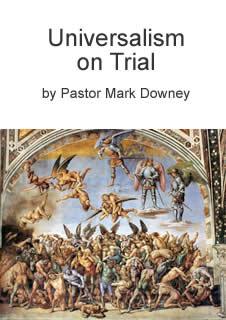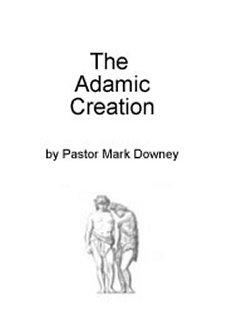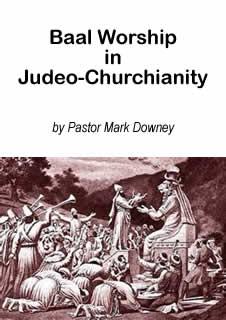by Pastor Mark Downey
I have been Christian Identity since 1976, but I am not Dual Seedline. I have read just about every expositor for this theory and have come to the conclusion that a bit of a theological shell game has been played upon the casual observer “at a glance.” It is not (IMHO) the two seeds [sic] of Gen. 3:15 that carry this theory, but rather the idea of a supernatural being acting as the only adversary to God who created what we know today as jews. Without this supernatural character, the whole Dual Seedline theory collapses. I put the [sic] after the word “seeds”, because it is a poor translation from the KJV and suggests that spirit beings, otherwise known as angels, can arbitrarily change to physical beings, biologically having a reproductive capacity. There is no biblical foundation for this assumption. Within Dual Seedline itself there are variations of opinion as to what actually impregnated Eve.
A better translation of Gen. 3:15 would be offspring or progeny instead of the word “seed”. There is no reason to label this distinction as “One Seedline”, which is a terrible misnomer, just as much as the oft repeated label of “no devil”. It is a matter of rightly dividing the Word of truth. Of course there are two parties involved with Gen. 3:15 and they are the offspring of Adam in contradistinction to the offspring of all other races. The offspring of Cain were technically not a race, but rather a mixed breed. They were hybrids of which God never meant for them to be born. The offspring of “Satan” is unnecessarily problematic. Whereas, the offspring of our adversaries are indeed literal. The common refrain is that this “Satan” has succeeded in fooling people that he/it doesn’t exist. I frequently hear the presumptuous question, "Don't you think “Satan” wants people to think he's not real?" The answer and truth of the matter is that jews don't want people discerning what the reality of liars and their lies represent. It is the jew and those who would believe a jew who symbolize the adversary or satan of Scripture. And guess what? They have succeeded in their deception. What then should be our priority? Proving the existence of a supernatural fallen angel or proving the adversarial nature of jewry to our race? History records enmity between our race and the other races coupled with these hybrids. The latter are adversaries of God and our race and their influence is the intent of the word satan, which means adversary. Therefore, Dual Seedline, which used to be called more appropriately Serpent Seedline (circa 1960-70’s) is not the focus of two given parties, but rather an assumptive entity that is interpreted as a supernatural being known as “Satan” or the Devil or in the Genesis narrative, the serpent, which deserves more than a glance and a pick and choose theology from extrabiblical sources that may not correspond and harmonize with Scripture as a whole.
First, a certain "snake" needs to be exposed for what this symbolic form actually represents. Although it is common knowledge that man’s mind has the capability of both good and bad thoughts, even today, "scientists" cannot satisfactorily explain how "evil" thoughts creep into our mind. Most people’s minds have experienced the bewilderment of how a bad thought will suddenly pop into awareness, silently, insidiously, without warning, usually as an unwanted thought. While this process is still scientifically unexplainable, one need not be a "scientist" to know that such evil thoughts just simply appear, in much the same manner that we become aware of the physical presence of a snake. . . silent, unwarning, subtle ("subtil"), and, even more, it is commonly accepted that "evil" thoughts are usually of a "poisonous" nature.
To the ancient Hebrews, confronted with trying to explain how "evil" thoughts slip into the conscious mind, the "snake" was the ideal symbolic explanation, because the nature of "snakes" was commonly known to all the people from their everyday encounters and observations.
The Hebrews used the word, "nachash", which was later translated into the Greek word, "ophis" (derived from "optomai"), and, then, into the Latin word, "serpens" (derived from "serpere"), meaning "to creep~. Hence, the familiar word "serpent" as used in the King James Version of the Bible. The word "snake" is derived from the Anglo-Saxon word, "snaca" meaning "to creep or sneak". The Hebrew word, "nachash", had a far wider usage-meaning than that of a reptile, such as the Latin word, "serpent", tends to convey.
"Nachash, naw-khash'"; is a primitive root word that can mean to hiss or whisper a (magic) spell, or to foretell the future, or a divine enchantment, or to learn by experience, or to diligently observe, among other meanings that have probably been lost in the passage of time.
Nevertheless, this brief comparison of the derivation of the word "serpent" and the original Hebrew "nachash" shows the vast differences in the usage and meanings of these two words, which would lead any reasonable mind to the conclusion that what the original Hebrew teachers were trying to express, symbolically, was not a reptile ("serpent"), but an "evil" thought, or thinking that "whispers" a (magic) spell or enchantment in the mind.
With that clarification in mind, the word "subtil" should be scrutinized, since this is the translated word for the original Hebrew word "aruwm". "Aruwm," (aw-room), means to be cunning in a bad sense, or crafty in a smooth or insidious way. "Subtil," or subtle, is derived from the Latin subtilis (sub = under + tela = web i.e., finer than a spider's web), and the word, subtle is defined with the following synonyms: thin, tenuous, keen, penetrating, delicately skillful or clever, deft, ingenious, crafty, wily, strangely suggestive, mysterious, sly, hard to solve or detect or understand, intricate, abstruse, acting in an insidious way.
With an understanding of these words, the old Hebrew teachers were rather obviously trying to teach that evil thoughts were so insidious, clever, cunning and extremely enchanting to the degree of putting the person's mind into a kind of magic spell, as compared with good thoughts that are open, honest, straightforward and upright, so they made that point in a most colorful, symbolic statement: "Now the serpent ("nachash") was more subtil ("aruwm") than any beast ("chay") of the field ("sadeh") that the Lord God had made." (Gen. 3:1)
The "serpent" was not an actual reptile ("snake"), but rather evil thoughts. In other words, evil thoughts are so sneaky and cunning, compared with righteous thoughts, that it is like comparing a "snake" to other animals. The "serpent" was not a "talking snake", but rather the thoughts that entered the mind of the woman! With this understanding, the following passages are typical of the reasoning process of mankind’s mind, and should be recognizable by any Adamic/Israelite person.
"Now the serpent was more subtil than any beast of the field which the Lord God had made. And he said unto the woman, Yea, hath God said, Ye shall not eat of every tree of the garden?
And the woman said unto the serpent, We may eat of the fruit of the trees of the garden:
But of the fruit of the tree which is in the midst of the garden, God hath said, Ye shall not eat of it, neither shall ye touch it, lest ye die.
And the serpent said unto the woman, Ye shall not surely die:
For God doth know that in the day ye eat thereof, then your eyes shall be opened, and ye shall be as gods, knowing good and evil.
And when the woman saw that the tree was good for food, and that it was pleasant to the eyes, and a tree to be desired to make one wise, she took of the fruit thereof, and did eat, and gave also unto her husband with her, and he did eat.
And the eyes of them both were opened, and they knew that they were naked; and they sewed fig leaves together, and made themselves aprons." (Gen. 3:1-7)
The fact that this entire conversation was nothing more than the thoughts being processed in the mind of the woman is revealed by the woman's statement, "Ye shall not eat of it, neither shall ye touch, lest ye die." (Ge 3:3). Now we know that the man (Adam) was directly and personally commanded by God: "But of the tree of the knowledge of good and evil, thou shalt not eat of it; for in the day that thou eatest thereof thou shalt surely die" (Gen. 2:17). This was God's only commandment, and only to the man. God did not command the man, "neither shall ye touch it." So where did the woman get the thought or idea of, "neither shall ye touch it"? Obviously, either the man (Adam) instructed the woman in that manner, or the woman deduced that conclusion for herself. She certainly didn't get that information from any "talking" serpent, because she volunteered the information to the serpent!
In either case, the point is clearly made that the man and the woman were capable of reasoning, just like the mind of man reasons today. It is now possible to make this entire episode crystal clear. To understand what those ancient Hebrews were trying to teach, the meaning becomes obvious when the same story is told in contemporary language. The first man allegedly created by the Lord God was given a reasoning mind and commanded:
"You may freely think righteous thoughts, but you shall not think evil thoughts, for on the day that you disobey my commandment, by thinking evil thoughts, then you shall surely die."
The first woman, who was created from a rib taken from the man by God, was also given a reasoning mind, and God brought her to the man. Therefore, in marriage, a man and woman are joined together as though they are of one body, and owe total fidelity, one to the other.
Now evil thoughts sneak into the mind of man, and pervert the thinking process, unlike righteous thoughts, which keep the mind honest, upright and straight. Just such an evil thought crept into the mind of the woman, "Didn't God give me a thinking mind that I might use it freely to think all kinds of thoughts, and God did not tell me that there were any thoughts I should not think."
Then the woman reasoned, "But the man (Adam) told me that not only was I not to think evil thoughts, but that I was not to even think of thinking evil thoughts, or I would die."
Then the woman rationalized, "Surely I won't die, because if I think evil thoughts, I will gain a knowledge of evil, and I can therefore know the difference between good and evil which will make me like God, and if I am a god, then I can't die because gods don't die, and God knows that." The more the woman thought these evil thoughts, the more she became convinced that her reasoning was sound ("And when the woman saw that the tree was good for food, and that it was pleasant to the eyes..."). She liked the idea of becoming a "god" ("...and a tree to be desired to make one wise..."). So, the woman decided that she would think evil thoughts, so she could be like a "god", to know good and evil ("...she took of the fruit thereof, and did eat...").
Then the woman discussed her decision with the man (Adam), her husband ("...and she gave also unto her husband with her..."). The man (Adam) decided to think evil and become like a "god", to know good and evil, therefore, the man joined with the woman in doing evil by disobeying God's commandment ("...and he did eat."). Thereby, the man, not the woman, disobeyed God’s Law and caused the downfall of mankind.
Certainly the above "modern" rendition of Genesis 3:1-6 can be readily understood, because our minds still work in this same way today, just as they did in those days past. Everyone will recognize themselves as one of these two persons, because every person plays just such a role in every day life, e.g., the "little white lies", the greed to have more of everything, even if it means being "just a little bit bad," wanting to be "just a little bit better" than the rest of their race, and on, and on.
The "serpent" was nothing more than a symbol to depict the "snake in the grass" of the Adamic mind, and it is time to continue the story in this same contemporary manner. Once the man and the woman fully understood ("And the eyes of them both were opened. . .") that they had committed a SIN (disobeying God's commandment), they knew they were guilty ("and they knew that they were naked. . ."), so they tried to cover up their "sin" ("and they sewed fig leaves together, and made themselves aprons."). (Gen. 3:7). Now isn't that the thing mankind does?
Don't most people use an alibi to "fig leaf" over whatever they have done that is wrong? Today, we don't use "fig leaves", we use an "alibi", or "excuses", or "rationalizations". And the same understandably Adamic behavior continued as the story further unfolded. Then came God, the righteous judge, and the man and the woman tried to evade facing the judgment of their sin ("And they heard the voice of the Lord God walking in the garden in the cool of the day: and Adam and his wife hid themselves from the presence of the Lord God amongst the trees of the garden. . .") by pretending they didn't hear the call to judgment. (Gen. 3:8).
Don't most people feel a "seizure of conscience" or a "burden of guilt" after they have done something that they know is wrong, just like the man (Adam) and the woman? If they do not then they would be classified as a sociopath.
Then God, the righteous judge, opened the first session of the first earthly court by summoning the first defendant of our race, ("And the Lord God called unto Adam..."). God, as the righteous prosecutor, began the first legal direct examination in the history of mankind ("...and said unto him, Where are thou?"). Then, God heard the first man alibi ("...And he said, I heard thy voice [my mind] in the garden, and I was afraid, because I was naked [because I had sinned by not obeying your commandment]; and I hid myself [tried to avoid responsibility for my actions]". (Gen. 3:10).
To which God began the world's first cross-examination: "And He said, who told thee that thou wast naked (had sinned)? Has thou eaten of the tree (thought evil thoughts), whereof I commanded thee that thou shouldest not eat (think)?" (Gen. 3:11).
Adam responded to the question in a rather typical manner by trying to alibi, again, and tried to put the blame on someone else for his own actions. First, Adam blamed God: "And the man said, The woman whom thou gavest to be with me. . .". Secondly, Adam blamed the woman: "...she gave me of the tree [put the evil thoughts in my mind], and I did eat [so I thought the evil thoughts]." (Gen. 3:12).
Even though Adam tried to put the blame on her, it would seem obvious that Adam didn't understand the modern concept of plea bargaining. Today, even petty criminals know enough to not antagonize either the judge, or the prosecutor, since our present system of justice gives them "discretion". Adam did both! Criminals today know to ask for immunity, or a reduced sentence, for a confession and cooperation in helping to convict a co-defendant, and that's "just for openers".
So, by today's standard of criminal justice, under man's laws, we know that Adam didn't seem overly bright in that particular situation. Certainly more to the point is the Biblical confirmation of the fact that God directly, and personally commanded only Adam ("Hast thou eaten of the tree, whereof I commanded thee that thou shouldest not eat?"). (Gen. 3:11). This is further confirmed by the fact that God, in a direct examination of the second defendant did not refer to her having received a direct, personal commandment, ("And the Lord God said unto the woman, What is this that thou hast done?...." Gen. 3:13).
The woman responded quite honestly, saying: "The serpent (evil thoughts) beguiled me (I convinced myself that I could be a "god"), and I did eat (I thought evil thoughts and disobeyed the commandment)." (Gen. 3:13). With the confessions duly establishing the guilt of the defendants, the first judgment [for the offense of evil thinking in the mind of man, and the consequences of that "sin"] was delivered.
However, God first condemned the evil thoughts [the "serpent"]: "And the Lord God said unto the serpent, Because thou hast done this, thou are cursed above all cattle, and above every beast of the field; upon thy belly shalt thou go, and dust shall thou eat all the days of thy life: And I will put enmity between thee and the woman, and between thy seed and her seed; it shall bruise thy head, and thou shalt bruise his heel." (Gen. 3:14, 15).
What the Lord God said can be readily understood in contemporary thinking.
1. Evil thoughts in the mind of man were cursed to be the lowest of anything on earth, and would produce little true satisfaction.
2. Evil thoughts would, thereafter, continually enter the mind of man.
3. Evil thoughts would be continually be opposed by righteous thoughts, and righteous thoughts would have the power to overcome evil thoughts in the mind of mankind.
Having pronounced judgment and sentence on evil thinking [the "serpent", that "snake of evil thought" in the mentality of mankind], and "sin" [disobeying of God's Law], the Lord God, then delivered the first criminal sentence in man’s history [for evil thinking and sin]: "Unto the woman he said, I will greatly multiply thy sorrow and thy conception; in sorrow thou shalt bring forth children; and thy desire shall be to thy husband, and he shall rule over thee." (Gen. 3:16). To this very day, women endure that "curse" on a monthly basis. Indeed sorrowful, is the prolonged period of gestation and the hormonal upheaval of childbearing. God's punishment of the female was exquisite in its scope and detail.
Finally, God passed sentence on the man: "And unto Adam he said, Because thou hast hearkened unto the voice of thy wife, and hast eaten of the tree, of which I commanded thee, saying, Thou shalt not eat of it; cursed is the ground for thy sake; in sorrow shalt thou eat of it all the days of thy life; Thorns and thistles shall it bring forth to thee; and thou shalt eat the herb of the field; In the sweat of thy face shalt thou eat bread, till thou art return unto the ground; for out of it wast thou taken; for dust thou art, and unto dust shalt thou return." (Gen. 3:17-19).
The punishment of the man, Adam, was, comparatively, rather lenient. Men were condemned to earn their keep by the sweat of their brows, working would not be easy and their reward, no matter how hard they worked, was that they would all end as dust.
A comparison of the bill of particulars, containing the charges against each of the defendants in this trial, would read, possibly at the least, as follows:
Woman:
1. First to have evil thoughts
2. First to sin
3. First to induce another to commit a capital crime
4. Misprision of felony in concealing a sin
Man:
1. Malfeasance, misfeasance and nonfeasance as keeper of the garden, and in the custodial care of the woman
2. Aiding, abetting and accessory in the commission of a capital crime
3. Misprision of felony in concealing a sin
4. Misrepresentation
5. Slander
What does the Genesis account teach us? To blame others for our sins and thus a scapegoat? Or do we learn how to be accountable for what we do in life? Two very important differences and concepts. The aforementioned exegesis above does no harm to Scripture and is hardly outrageous as some hardcore pro-devil advocates would have you believe. By the same token, no quarter is reserved for antichrist jewry/Esau-Edom, “For the weapons of our warfare are not carnal, but mighty through God to the pulling down of strong holds.” II Cor. 10:4.

















